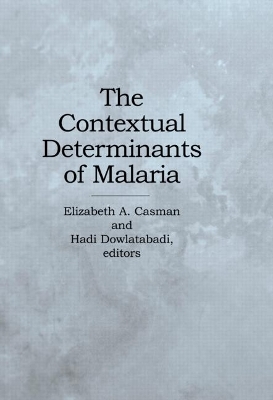
The Contextual Determinants of Malaria
Resources for the Future Press (RFF Press) (Verlag)
978-1-891853-19-7 (ISBN)
- Titel ist leider vergriffen;
keine Neuauflage - Artikel merken
As malaria and other tropical diseases continue their resurgence, questions about the potential impacts of environmental and demographic factors are becoming more critical. Recent attempts to understand the increase in malaria incidence often acknowledge the importance of social, economic and other contextual variables, but fail to explicitly incorporate them into models or consider how they evolve in relation to one another. This problem is of crucial interest to the climate policy community, which has been buffeted by claims and counter-claims concerning the impact of climate change on malaria.
This important volume examines the contextual determinants of malaria and attempts to develop methods for incorporating them into projections of future incidence. Internationally renowned health specialists, economists, and other social scientists provide regional and global perspectives on risk modeling, the history of eradication efforts, current determinants (including environmental, social, and economic factors), and prospects for new vaccines and drugs. The Contextual Determinants of Malaria argues that an association of climate change with increased malaria incidence will have at least as much to do with human aging, poverty, urbanization, and population movement as with a rise in global temperatures. By placing climate in this perspective, The Contextual Determinants of Malaria focuses attention on the public health needs most critical in both the immediate and long-term future. It encourages multidisciplinary analysis of malaria control, and improves our understanding of the interactions of the diverse range of factors involved in the incidence and spread of the disease.
Elizabeth A. Casman is a research engineer in the department of Engineering and Public Policy at Carnegie Mellon University. Hadi Dowlatabadi holds a Canada Research Chair in Applied Mathematics at the University of British Columbia, and is a university fellow at Resources for the Future. Formerly, he was director of the Center for the Integrated Study of the Human Dimensions of Global Change at Carnegie Mellon University.
Foreword
Workshop Participant List
Preface
Section 1: Malaria and Climate Change: Issues and Analytic Tools
International Efforts to Understand the Linkage Between Climate Change and Malaria
Anthony McMichael
Of Malaria and Models: Challenges in Modeling Global Change and Malaria Risk
Pim Martens with discussion by Duane Gubler
Malaria Potential and Malaria Risk
Elizabeth Casman
Section 2: Regional Assessments: Contextual Determinants of Malaria
Determinants of Malaria in the Americas
Donald Roberts
The Control of Malaria in Brazil
Renato Gusm o
Contextual Determinants of Malaria in the WHO European Region (Europe, the Caucasus, and Central Asia)
Guido Sabatinelli
Determinants of Malaria in Oceania and East Asia
Allan Schapira
Determinants of Malaria in South Asia
Vinod Prakash Sharma with discussion by Robert Bos
Determinants of Malaria in the Middle East and North Africa
Andrei Beljaev
Determinants of Malaria in Africa
Jonathan St. H. Cox, Jean Mouchet, and David J. Bradley
Section 3: A Changing Context
Climate Variability, Climate Change and Malaria
Reid Basher and Mark Cane
Great Expectations: Antimalaria Vaccines and Drugs for the Next Century
Robert Desowitz
Future World Population Growth, Regional Distribution, Aging, Urbanisation and Climate Change
Wolfgang Lutz
Reading the Tea Leaves: Economic Scenarios for the 21st Century
Lester Lave and Hadi Dowlatabadi
Population Migration and Malaria
Janice Longstreth and Anatole Kondrachine
Recent Trends, Magnitude, and Patterns of Human Population Movement
Ilya Fischhoff
Malaria Control and the Future of International Public Health
Socrates Litsios
Section 4. Synthesis
Integrated Assessment of Malaria Risk
Baruch Fischhoff, Ilya Fischhoff, Elizabeth Casman, Hadi Dowlatabadi
The Importance of Context in Defining Malaria Risk: Summary and Discussion
| Erscheint lt. Verlag | 25.10.2002 |
|---|---|
| Verlagsort | Washington |
| Sprache | englisch |
| Gewicht | 816 g |
| Themenwelt | Medizin / Pharmazie ► Medizinische Fachgebiete ► Mikrobiologie / Infektologie / Reisemedizin |
| Studium ► Querschnittsbereiche ► Prävention / Gesundheitsförderung | |
| Naturwissenschaften ► Biologie ► Ökologie / Naturschutz | |
| Naturwissenschaften ► Geowissenschaften ► Geografie / Kartografie | |
| ISBN-10 | 1-891853-19-8 / 1891853198 |
| ISBN-13 | 978-1-891853-19-7 / 9781891853197 |
| Zustand | Neuware |
| Haben Sie eine Frage zum Produkt? |
aus dem Bereich


